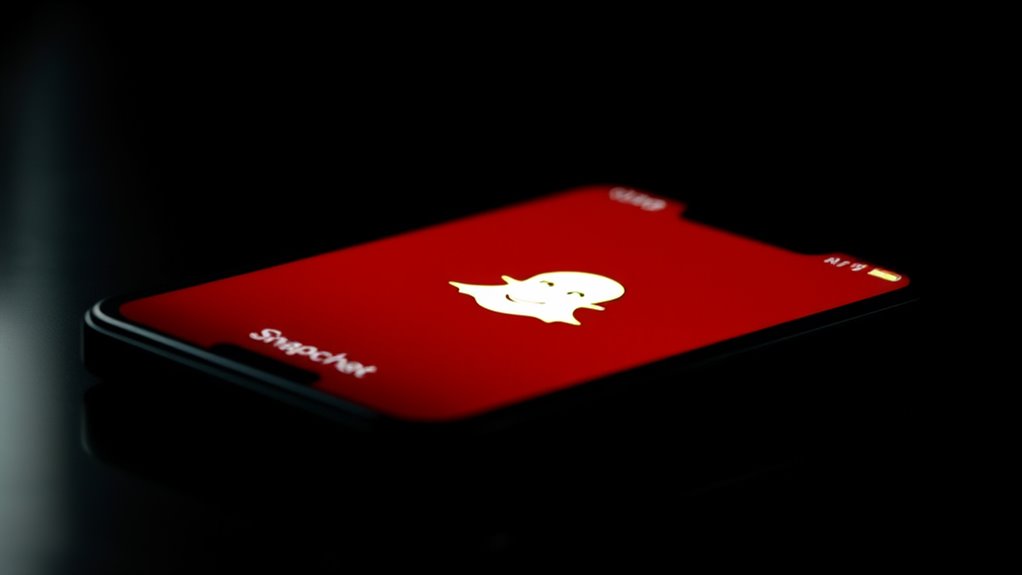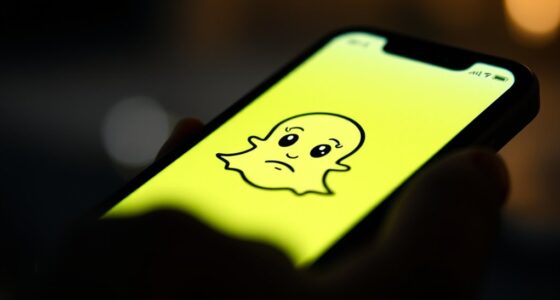On Snapchat, the 🤡 emoji usually signals playful teasing, sarcasm, or mockery, stemming from its evolution from simple symbols of humor to a versatile icon used to convey fun, embarrassment, or irony. It can mean someone is joking around or teasing you in a lighthearted way, but it might also suggest mockery or sarcasm depending on the context. To understand its true meaning, pay attention to tone and other messages—if you keep exploring, you’ll uncover even more about its uses.
Key Takeaways
- On Snapchat, 🤡 generally indicates playful teasing, joking, or light-hearted mockery among friends.
- It can signal sarcasm or irony, especially when paired with exaggerated or humorous messages.
- The emoji’s meaning depends on context, often implying silliness, embarrassment, or humorous insult.
- Repeated use may suggest annoyance or mockery, so responses should clarify intent calmly.
- Combining 🤡 with other emojis can enhance message clarity, emphasizing humor or teasing tone.
Origins of the 🤡 Emoji in Digital Communication
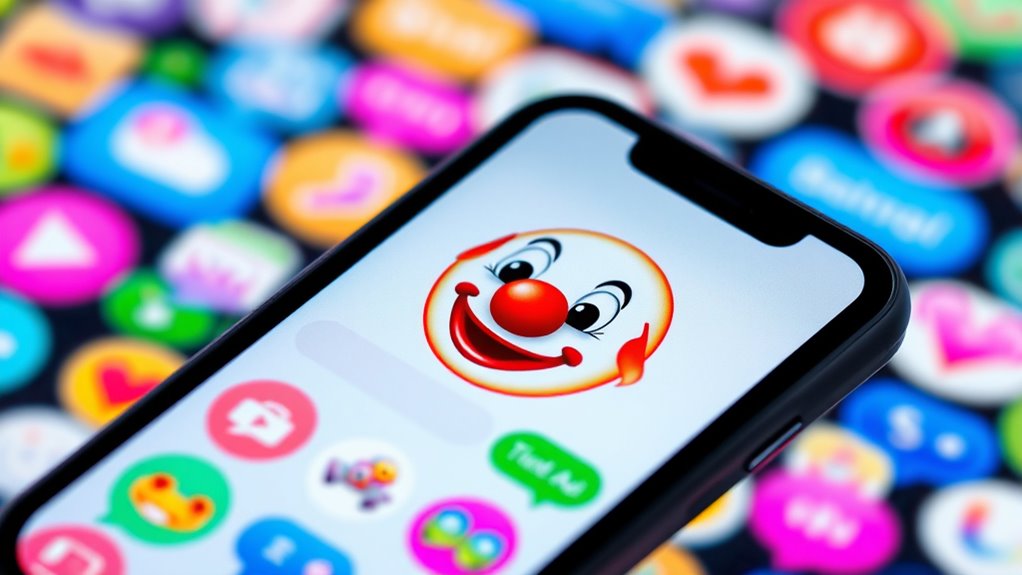
Have you ever wondered where the 🤡 emoji first appeared in digital conversations? It’s tied to the fascinating history of emoji evolution, which transformed how we communicate online. Originally, emoji started as simple symbols in Japan during the late 1990s, aiming to add emotional context to text. Over time, this emoji language development accelerated, leading to a vast array of expressive icons like 🤡. The clown face emerged as part of this growth, initially representing humor or foolishness. As emojis gained popularity across platforms, their meanings expanded beyond literal depictions. Today, 🤡 is often used to signify mockery, silliness, or embarrassment, but its origins remain rooted in the broader story of how digital symbols evolved into a nuanced language for expressing complex emotions quickly and efficiently. Additionally, the role of color accuracy and visual design in emojis contributed to their ability to convey specific emotions effectively across diverse cultures.
Common Uses of 🤡 on Snapchat

You’ll often see 🤡 used on Snapchat to playfully tease friends or make jokes. It’s also common for people to use it when they’re mocking something or just being silly. This emoji helps convey a sense of fun and lightheartedness in your conversations.
Playful Teasing Moments
Ever wonder how friends use 🤡 to mess around on Snapchat? It’s a playful way to tease or joke without serious implications. This use ties into the history of emojis, which started as simple symbols to add emotion to texts. Over time, emoji design trends have shifted toward more expressive and humorous icons, making 🤡 perfect for lighthearted teasing. When you send a 🤡, you’re usually poking fun, joking, or playfully mocking someone in a friendly way. It’s a visual cue that your message isn’t meant to offend but to share a laugh. This playful teasing helps friends keep conversations fun and lively, using the clown emoji as a symbol of humor and camaraderie in digital chats. Additionally, understanding the emotional expression behind emojis like 🤡 can enhance how we interpret online interactions and tone.
Mocking or Joking Tone
When someone sends 🤡 on Snapchat, it often signals that they’re joking or mocking in a lighthearted way. This use reflects the emoji evolution, where symbols take on new meanings in digital slang. You might see 🤡 used when someone wants to:
- Playfully tease a friend about a silly mistake.
- Mock an exaggerated or over-the-top comment.
- Lighten the mood after a serious or tense exchange.
- Convey a sense of humor or sarcasm in quick messages, especially since emojis are a popular form of visual communication.
The clown emoji isn’t always meant to offend; it’s often a way to show humor or sarcasm. Using 🤡 adds a layer of humor, making conversations more playful. It’s a quick, visual way to communicate sarcasm or jest, fitting neatly into the fast-paced world of digital slang.
Expressing Silliness or Fun
Many Snapchat users send 🤡 to show they’re feeling playful or having fun. You might combine it with other emoji combinations to create a lighthearted message, emphasizing your silly side. The clown emoji is often used in slang interpretations to convey humor, craziness, or just a silly mood. When you send 🤡, it signals that you’re not taking things seriously and want to keep the vibe fun and relaxed. People often use it to tease friends or react to funny situations with a playful tone. It’s a handy emoji to express your goofy side without over-explaining. Overall, 🤡 is your go-to for adding a sense of humor and silliness to your Snapchat conversations, making interactions more lively and amusing. Incorporating emojis like 🤡 can also help convey your mood more effectively, similar to how emotional well-being influences communication styles.
Playful vs. Mocking: Interpreting the Emoji’s Tone
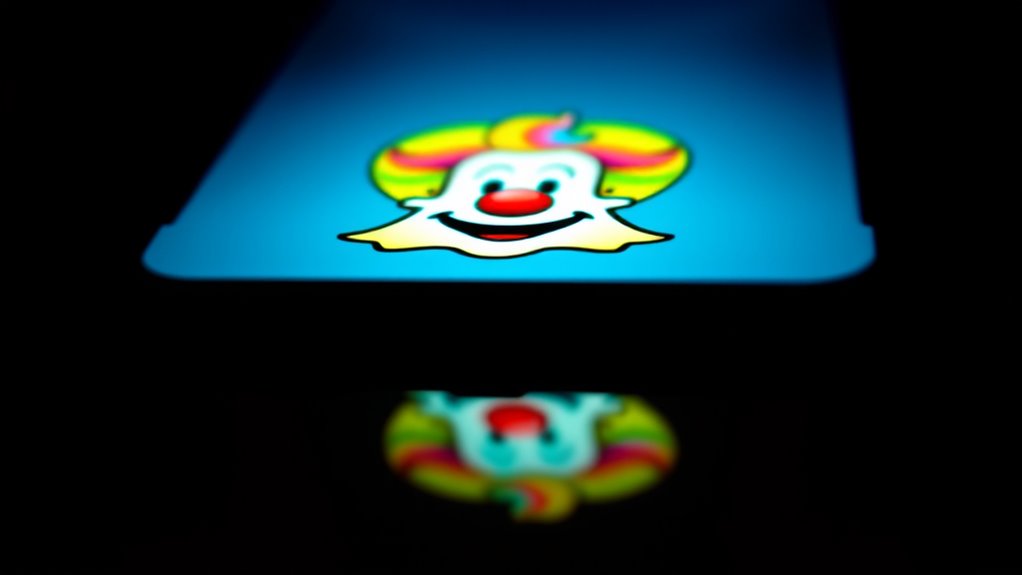
Determining whether 🤡 on Snapchat signals playfulness or mockery depends on the context and your relationship with the sender. As emoji evolution continues, their meanings can shift with social media trends, making tone interpretation tricky. To gauge intent, consider these cues:
- If the clown emoji accompanies a joke or teasing comment, it’s likely playful.
- If it appears after a sarcastic remark, it might be mocking.
- The sender’s usual tone and your rapport can clarify whether they’re joking or insulting.
- Be aware that emoji meanings can vary based on current trends and social context.
Situations Where 🤡 Might Appear in Conversations
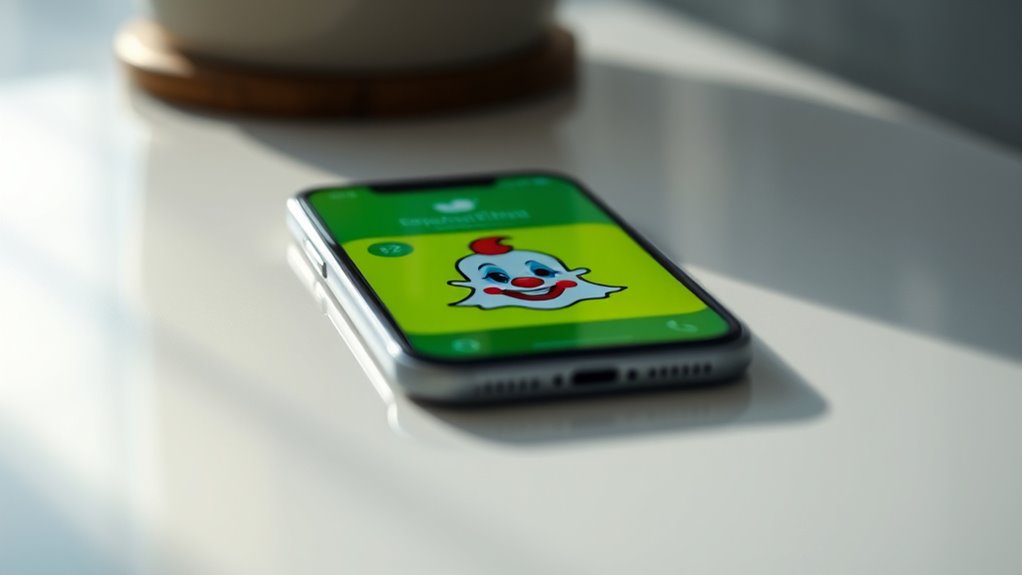
You might see 🤡 when someone’s teasing you playfully or joking around. It also pops up if someone calls out immaturity or behavior they find silly. Sometimes, it’s used to mock or show sarcasm in a conversation. Additionally, understanding the personality traits behind such expressions can help interpret the tone and intent more accurately.
Playful Teasing Moments
Ever found yourself chuckling after someone sends a 🤡 in a chat? That’s a classic playful teasing moment, part of the emoji evolution turning simple symbols into tools for humor. You might see 🤡 when a friend jokes about their own silly mistake or teases you about something funny you did. It’s a way to keep the mood light and fun. Imagine these scenes:
- You mess up a quick reply and get a 🤡 as a playful nudge.
- Someone drops a funny meme, and 🤡 shows they’re joking around.
- You call out a silly mistake, and 🤡 signals it’s all in good fun.
Using 🤡 as digital slang keeps conversations lively, adding humor without words. It’s a subtle way to tease that’s become part of modern communication’s emoji evolution. Incorporating playful emojis like 🤡 helps develop digital literacy by understanding how visuals influence online interactions.
Calling Out Immaturity
When someone responds with a 🤡 in a serious or dismissive context, it often signals they’re calling out immaturity or childish behavior. In digital communication, this emoji has evolved from playful teasing to a way to highlight when someone acts foolishly. You might see 🤡 used when someone makes a questionable decision or acts immaturely during a conversation. It’s a way to call out behavior without direct confrontation, shining a light on the lack of seriousness. As emoji evolution progresses, 🤡 has become a shorthand for pointing out stupidity or lack of judgment. When you notice it in serious chats, it’s usually a sign that someone perceives the other person’s actions as childish or unwise, signaling a need for more maturity in the discussion. Additionally, ongoing concerns about AI security emphasize the importance of trustworthy communication and detecting malicious or immature interactions in online spaces.
Expressing Mockery or Sarcasm
In conversations where someone’s actions or statements seem exaggerated or ridiculous, the 🤡 emoji often appears as a form of mockery or sarcasm. This use reflects the emoji evolution from simple expressions to tools for conveying tone on social media slang. You might see 🤡 when someone is making a foolish comment, acting clueless, or trying to impress but failing. Imagine:
- Someone bragging loudly about an obvious failure.
- A person confidently giving bad advice.
- A friend posting a cringeworthy joke.
In these moments, 🤡 signals you’re calling out the absurdity or insincerity. It’s a quick way to mock without words, fitting perfectly into the fast-paced, often sarcastic language of social media slang. The emoji’s evolution has made it a versatile tool for expressing humor and disdain simultaneously. Additionally, understanding cultural cultural perceptions of emojis can help clarify the intended tone in diverse online interactions.
How to Recognize When Someone Is Using 🤡 Ironically
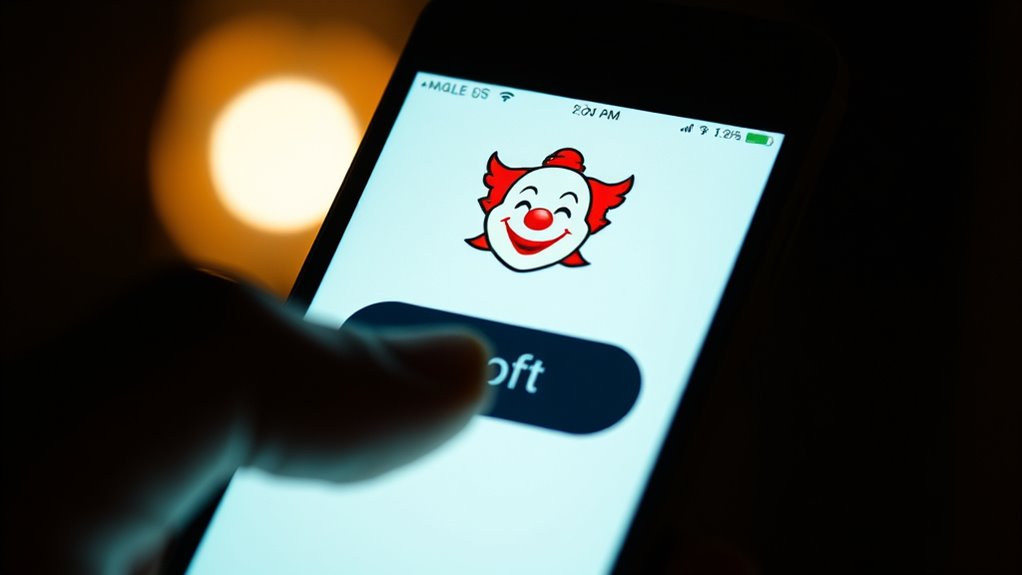
Recognizing when someone is using 🤡 ironically on Snapchat can be tricky, but there are key signs to watch for. Pay attention to the emoji symbolism and how it’s paired with other digital expressions. If someone uses 🤡 alongside exaggerated or sarcastic comments, they may be signaling humor rather than mockery. Look for context—if the message seems playful or self-deprecating, it’s likely irony. Also, consider the tone of their other messages or snaps; irony often comes through in the way they frame their words. Sometimes, the 🤡 emoji acts as a visual cue, indicating they’re not being entirely serious. Being aware of these subtle cues helps you understand whether the emoji is used sincerely or ironically. Additionally, understanding the digital language and how emojis are part of online communication can help you decode such nuanced expressions more effectively.
Alternatives to 🤡 for Expressing Humor or Sarcasm

If you want to express humor or sarcasm on Snapchat without relying solely on the 🤡 emoji, there are plenty of alternatives that can get your point across more effectively. Using emoji combinations or alternative expressions can add nuance and clarity to your message. For example, you might:
Express humor or sarcasm on Snapchat beyond 🤡 with clever emoji combos and witty phrases for clearer tone.
- Pair 😂 with a wink 😉 to signal sarcasm behind a joke.
- Use 🙃 to show playful teasing or irony.
- Combine 💀 and 🤣 to highlight a hilarious or absurd situation.
- Incorporate emoji usage strategies to enhance your message clarity and tone.
These options help convey tone more precisely than a single emoji. By mixing emojis or using witty phrases, you make your message stand out and cut through the ambiguity often associated with 🤡. Experimenting with these alternatives can make your humor sharper and your sarcasm clearer.
Cultural and Contextual Factors Affecting Its Meaning
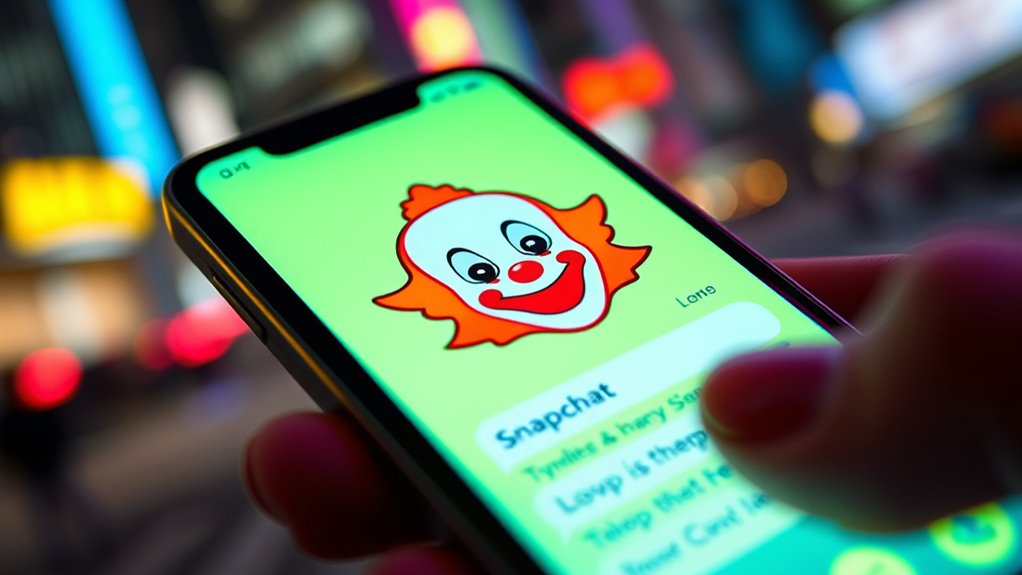
The meaning of the 🤡 emoji on Snapchat varies greatly across different cultures and social contexts, shaping how your messages are interpreted. As emoji evolution progresses, its significance shifts from playful jest to potential insult, influenced by cultural norms and digital slang. In some regions, 🤡 might symbolize foolishness or mockery, while in others, it’s just a funny joke. Understanding these nuances helps you avoid misunderstandings. Here’s a quick overview:
| Culture/Context | Meaning of 🤡 | Social Implication |
|---|---|---|
| Western | Clown or fool | Light-hearted teasing |
| Asian | Mockery or insult | Disrespectful tone |
| Online communities | Satire or sarcasm | Humor with edge |
| Formal settings | Inappropriate | Unprofessional tone |
Being aware of these factors ensures your digital slang stays effective and respectful. Recognizing cultural interpretations can help you navigate the diverse ways emojis are understood globally.
Tips for Responding When You See 🤡 in a Chat
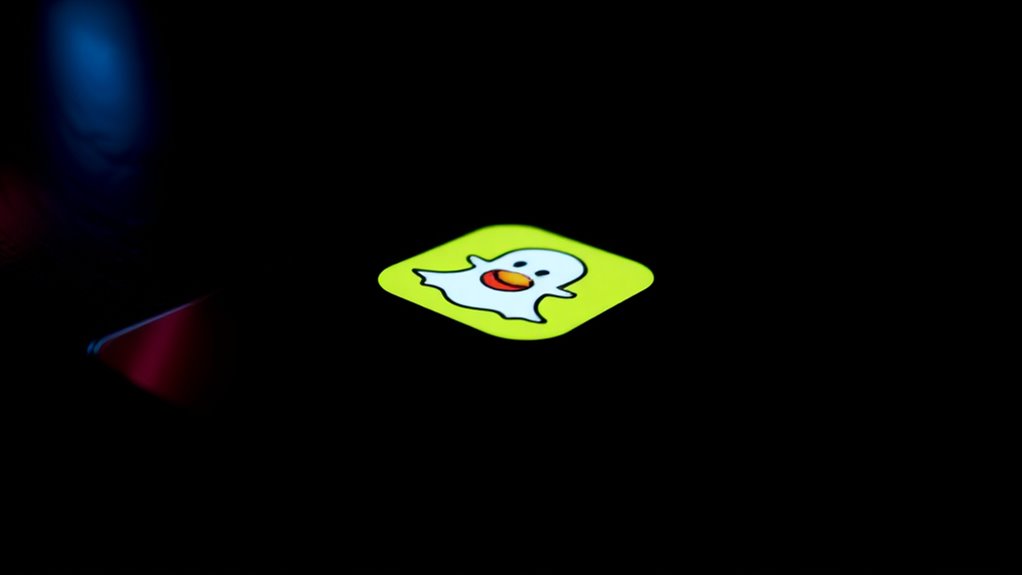
When you see 🤡 in a chat, it’s important to stay calm and avoid reacting impulsively. Clarify what the other person means before jumping to conclusions, so you understand their intentions. Keeping your response clear and composed helps prevent misunderstandings and keeps the conversation respectful. Understanding home decor inspiration and how to interpret social cues can help you navigate online interactions more confidently.
Stay Calm and Composed
Ever wonder how to stay calm and composed when you see 🤡 in a chat? Remember, emoji evolution reflects how digital communication constantly shifts. When you encounter a clown emoji, it’s easy to feel defensive, but staying level-headed is key. To keep your cool:
- Visualize the emoji as a joke or tease, not a personal attack.
- Take a deep breath and pause before replying.
- Focus on the message’s intent rather than jumping to conclusions.
- Recognizing toxic relationship signs can help you understand whether the emoji is part of playful banter or something more harmful.
Clarify Intentions Clearly
To effectively respond when you see 🤡 in a chat, it’s important to clarify the sender’s intentions directly and calmly. Recognize that emoji evolution and digital slang can shift meanings over time. Ask open-ended questions like, “Are you joking?” or “What do you mean by that?” to gain clarity. Use this table to interpret different responses:
| Response | Possible Meaning |
|---|---|
| “Just kidding!” | Lighthearted teasing |
| “Not serious.” | Playful sarcasm |
| “Why do you ask?” | Seeking clarification |
| Silence | Possible misunderstanding or confusion |
| Repeated 🤡 | Annoyance or mockery |
Understanding emoji evolution can help you better interpret the intent behind the 🤡 emoji.
The Evolution of Emoji Usage in Social Media

Emoji usage on social media has evolved from simple smiley faces to a diverse language that conveys complex emotions and ideas instantly. This emoji evolution reflects how social media trends drive communication, making it more visual and expressive. You can imagine:
- A heart emoji spreading love across hundreds of posts.
- A 😂 emoji capturing shared humor in seconds.
- A 🤡 emoji signaling playful teasing or mockery.
These symbols now serve as a universal shorthand, enabling quick understanding without words. As social media platforms grow, so does the way you use emojis to express feelings, sarcasm, or even social commentary. This shift highlights how digital communication continuously adapts, making emojis a core element of social media communication and shaping modern social media trends.
Staying Updated on Snapchat Slang and Emojis
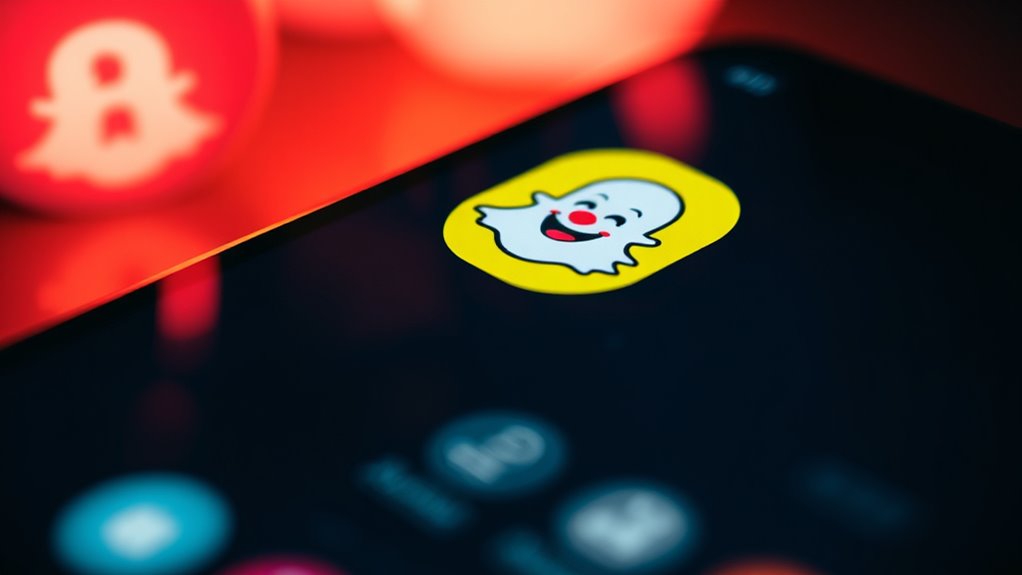
Staying updated on Snapchat slang and emojis can feel like a moving target as new terms and symbols constantly emerge. The emoji evolution is rapid, with each update introducing fresh icons that often carry nuanced meanings. To keep pace, it helps to do regular slang comparison, checking how terms are used among different groups. Follow social media trends and join online communities dedicated to decoding digital language. Pay attention to the context in which emojis appear, as their meanings can shift over time. Staying informed ensures you don’t miss subtle cues or misinterpret messages. By actively tracking these changes, you can better understand what your friends are communicating and stay connected in the ever-evolving landscape of Snapchat slang and emojis. Additionally, understanding Sun Protection can be important for maintaining healthy skin if you spend time outdoors while engaging with digital content.
Frequently Asked Questions
Can 🤡 Mean Something Positive or Is It Always Negative?
Clown emojis can have both positive and negative connotations depending on how you interpret them. While they often suggest someone’s acting silly or not serious, some people use clown emojis to playfully tease friends or show they’re joking around. You might see clown emojis used in a positive light when referencing humor or fun moments. So, they’re not always negative; context is key to understanding their meaning.
How Do I Tell if 🤡 Is Playful or Insulting?
To tell if the clown emoji interpretation is playful or insulting, consider the context and your relationship with the sender. If they use it with a joking tone or inside jokes, it’s likely playful. However, if it’s paired with negative comments or seems disrespectful, it’s probably insulting. Pay attention to their overall message and your comfort level, as tone and intent can shift based on the situation.
Is 🤡 Used Differently Among Various Age Groups?
Age-related slang and emoji evolution shape how you see 🤡 differently across generations. Younger users often see it as playful or silly, while older groups might interpret it as mocking or insulting. This contrast highlights the emoji’s flexible meaning, reflecting shifting cultural contexts. So, don’t assume everyone uses 🤡 the same way; instead, consider your audience’s age and familiarity with evolving emoji language to avoid misunderstandings.
Does the Meaning of 🤡 Vary Across Cultures?
You’ll find that 🤡 can have different meanings across cultures due to diverse cultural interpretations and regional slang. In some places, it might symbolize foolishness or mockery, while in others, it could be seen as playful or humorous. You should be mindful of these variations to avoid misunderstandings, especially when communicating across cultural boundaries. Always consider the context and the regional slang to interpret the 🤡 emoji accurately.
Are There Specific Snapchat Features That Influence 🤡 Usage?
Snapchat features like filters and emoji reactions can influence how you use 🤡. For example, funny filters might encourage playful or teasing 🤡 emojis during chats, while emoji reactions allow you to quickly respond with a 🤡 to show amusement or sarcasm. These features make it easy to add humor or mischief, shaping how you express silly or joking messages with the 🤡 emoji in your conversations.
Conclusion
Now that you know the meaning behind 🤡 on Snapchat, you’ll start noticing it more in conversations. But remember, its true intent can be tricky to decode—playful tease or mocking jab? The next time you see 🤡, consider the context carefully. Will you let it slide, or will you dig deeper? Stay tuned, because understanding emoji nuances might just change how you interpret your chats forever. The real story is still waiting to unfold.
